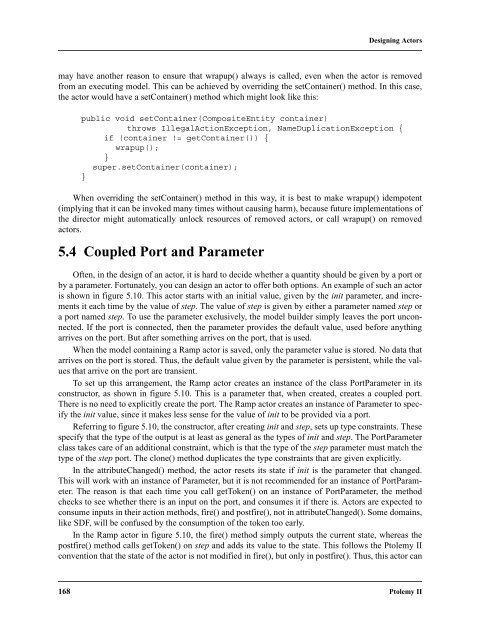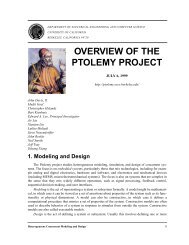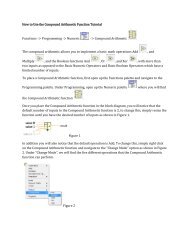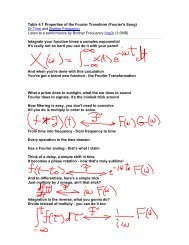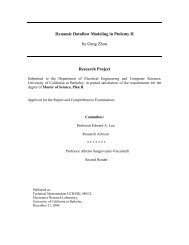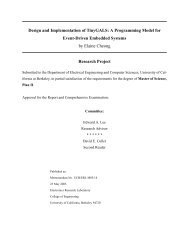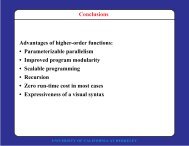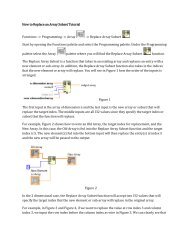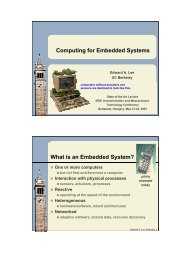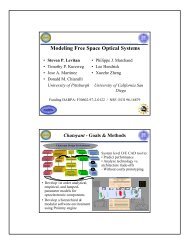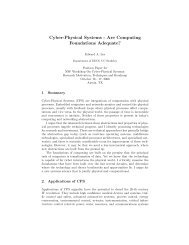PTOLEMY II - CiteSeerX
PTOLEMY II - CiteSeerX
PTOLEMY II - CiteSeerX
You also want an ePaper? Increase the reach of your titles
YUMPU automatically turns print PDFs into web optimized ePapers that Google loves.
Designing Actors<br />
may have another reason to ensure that wrapup() always is called, even when the actor is removed<br />
from an executing model. This can be achieved by overriding the setContainer() method. In this case,<br />
the actor would have a setContainer() method which might look like this:<br />
public void setContainer(CompositeEntity container)<br />
throws IllegalActionException, NameDuplicationException {<br />
if (container != getContainer()) {<br />
wrapup();<br />
}<br />
super.setContainer(container);<br />
}<br />
When overriding the setContainer() method in this way, it is best to make wrapup() idempotent<br />
(implying that it can be invoked many times without causing harm), because future implementations of<br />
the director might automatically unlock resources of removed actors, or call wrapup() on removed<br />
actors.<br />
5.4 Coupled Port and Parameter<br />
Often, in the design of an actor, it is hard to decide whether a quantity should be given by a port or<br />
by a parameter. Fortunately, you can design an actor to offer both options. An example of such an actor<br />
is shown in figure 5.10. This actor starts with an initial value, given by the init parameter, and increments<br />
it each time by the value of step. The value of step is given by either a parameter named step or<br />
a port named step. To use the parameter exclusively, the model builder simply leaves the port unconnected.<br />
If the port is connected, then the parameter provides the default value, used before anything<br />
arrives on the port. But after something arrives on the port, that is used.<br />
When the model containing a Ramp actor is saved, only the parameter value is stored. No data that<br />
arrives on the port is stored. Thus, the default value given by the parameter is persistent, while the values<br />
that arrive on the port are transient.<br />
To set up this arrangement, the Ramp actor creates an instance of the class PortParameter in its<br />
constructor, as shown in figure 5.10. This is a parameter that, when created, creates a coupled port.<br />
There is no need to explicitly create the port. The Ramp actor creates an instance of Parameter to specify<br />
the init value, since it makes less sense for the value of init to be provided via a port.<br />
Referring to figure 5.10, the constructor, after creating init and step, sets up type constraints. These<br />
specify that the type of the output is at least as general as the types of init and step. The PortParameter<br />
class takes care of an additional constraint, which is that the type of the step parameter must match the<br />
type of the step port. The clone() method duplicates the type constraints that are given explicitly.<br />
In the attributeChanged() method, the actor resets its state if init is the parameter that changed.<br />
This will work with an instance of Parameter, but it is not recommended for an instance of PortParameter.<br />
The reason is that each time you call getToken() on an instance of PortParameter, the method<br />
checks to see whether there is an input on the port, and consumes it if there is. Actors are expected to<br />
consume inputs in their action methods, fire() and postfire(), not in attributeChanged(). Some domains,<br />
like SDF, will be confused by the consumption of the token too early.<br />
In the Ramp actor in figure 5.10, the fire() method simply outputs the current state, whereas the<br />
postfire() method calls getToken() on step and adds its value to the state. This follows the Ptolemy <strong>II</strong><br />
convention that the state of the actor is not modified in fire(), but only in postfire(). Thus, this actor can<br />
168 Ptolemy <strong>II</strong>


